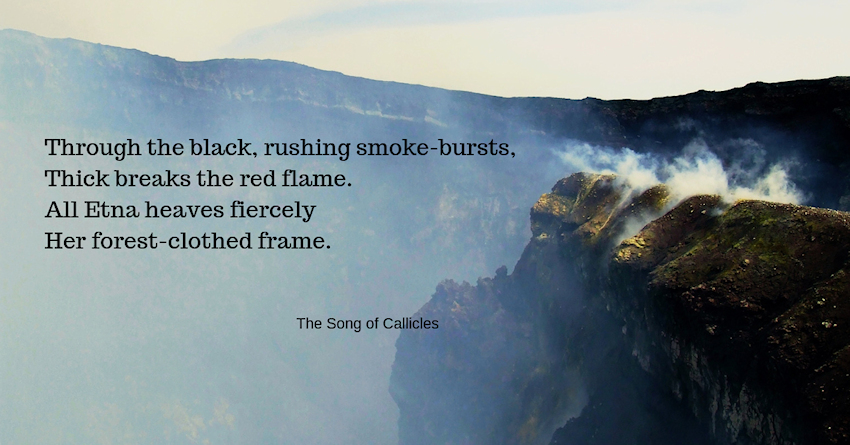
Matthew Arnold
(from Empedocles on Etna1)
Through the black, rushing smoke-bursts,
Thick breaks the red flame.
All Etna heaves fiercely
Her forest-clothed frame.
⋅
Not here, O Apollo!
Are haunts meet for thee.
But, where Helicon breaks down
In cliff to the sea.
⋅
Where the moon-silver’d inlets
Send far their light voice
Up the still vale of Thisbe,
O speed, and rejoice!
⋅
On the sward at the cliff-top,
Lie strewn the white flocks;
On the cliff-side, the pigeons
Roost deep in the rocks.
⋅
In the moonlight the shepherds,
Soft lull’d by the rills,
Lie wrapt in their blankets,
Asleep on the hills.
⋅
—What forms are these coming
So white through the gloom?
What garments out-glistening
The gold-flower’d broom?
⋅
What sweet-breathing Presence
Out-perfumes the thyme?
What voices enrapture
The night’s balmy prime?—
⋅
‘Tis Apollo comes leading
His choir, The Nine.
—The Leader is fairest,
But all are divine.
⋅
They are lost in the hollows.
They stream up again.
What seeks on this mountain
The glorified train?—
⋅
They bathe on this mountain,
In the spring by their road.
Then on to Olympus,
Their endless abode.
⋅
—Whose praise do they mention,
Of what is it told?—
What will be for ever.
What was from of old.
⋅
First hymn they the Father
Of all things: and then,
The rest of Immortals,
The action of men.
⋅
The Day in his hotness,
The strife with the palm;
The Night in her silence,
The Stars in their calm.
Biographical information on Matthew Arnold
- Wikipedia
- Poetry Foundation
- Encyclopaedia Britannica
- poets.org
- New World Encyclopedia
- Encyclopedia.com
- enotes
- Empedocles on Etna, a dramatic poem by Matthew Arnold, was published anonymously in 1852. The poem is based on legends around the death of Empedocles (c. 490–430 BCE), a Greek philosopher and statesman. Portrayed as a man with no joy, who feels useless intellectually and politically, he plans to kill himself by leaping into the Mt. Etna volcano. Two friends Pausanias, a physician, and Callicles, a young Harp-player, try to live his depression, to no avail. The Song of Callicles begins just after Empedocles has thrown himself into the crater. – “Empedocles on Etna.” Encyclopaedia Britannica. March 28, 2011. Accessed June 29, 2019. https://www.britannica.com/topic/Empedocles-on-Etna
- Elliott & Fry. Matthew Arnold. c. 1883. National Portait Gallery, London. In National Portrai Gallery. https://www.npg.org.uk/collections/search/portraitLarge/mw115288/Matthew-Arnold.
